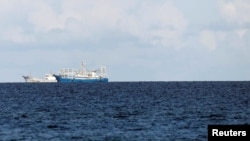China and Malaysia have entered another quiet but drawn-out standoff at sea where their sovereignty claims overlap, and each side is showing increased resolve to stand tall against the other, analysts following the two countries say.
Earlier this month, the China coast guard ship 5402 stationed itself near Luconia Shoals in a sea tract north of Borneo that Malaysia says belongs to its maritime exclusive economic zone, according to the Asian Maritime Transparency Initiative in Washington.
Beijing says the tract of water falls within its boundary line that encompasses about 90% of the South China Sea, a calculation based on historic usage records. Brunei, Malaysia, the Philippines, Taiwan and Vietnam contest some or all of China’s claims to the 3.5 million-square-kilometer sea that’s rich in fisheries as well as energy.
On November 19, China’s ship harassed a Malaysian drilling rig and supply ships that were operating 44 nautical miles (81.5 kilometers) offshore, according to the initiative, which is under the Center for Strategic and International Studies, a U.S. think tank. Malaysia deployed a naval vessel in response, and that vessel is shadowing the Chinese ship, its November 25 report says.
Incidents of this sort are becoming common, scholars in Malaysia say, though they usually go unnoticed because the two governments mostly get along and play down disputes.
Malaysia is keen now to take “effective steps” in protecting its sovereignty claims by proving use of the sea, said Oh Ei Sun, senior fellow with the Singapore Institute of International Affairs.
Malaysia submitted documentation to the U.N. Commission on the Limits of the Continental Shelf in December 2019 concerning plans to extend its rights over the South China Sea beyond 370 kilometers from its original boundaries. The documentation, linked to a related application that Malaysia and Vietnam made 10 years ago, met with opposition from China's U.N. mission.
Malaysia's ships often make verbal contact with their Chinese counterparts, said Shahriman Lockman, senior foreign policy and security studies analyst with the Institute of Strategic and International Studies research organization in Malaysia.
Only the location, he said, of this month’s appearance by a Chinese coast guard ship and Malaysia’s tailing of it stands out.
Similar incidents take place as often as once a week, he said.
“It is rare that this has taken place so close to the coast, but otherwise this is becoming quite normal,” Lockman said. Officials in Malaysia find the incidents upsetting, he added, “but what can they do?”
Scholars have said Malaysia keeps quiet about tiffs with China because of their strong economic relationship. Malaysia counts China as its top export market, and China became Malaysia’s biggest foreign investor in 2016. Malaysia’s Ministry of Foreign Affairs announced November 18 that the country had signed a vaccine development deal with China.
Officials in Vietnam and the Philippines have spoken out more often against China over the past decade, especially as China landfilled some of the sea’s disputed islands for military use. Under President Donald Trump, the U.S. government has stepped up military support for Southeast Asia and Taiwan as a way of holding off China.
Chinese vessels sailed near Malaysian work sites in October 2019, targeting two specific oil and gas blocks, the U.S. initiative said. It said Chinese coast guard vessels patrolled then near a drillship contracted to the Malaysian oil and gas giant Petronas.
The current standoff is neither escalating nor deterring the Chinese from a new mission to the same waters, said Oh of the Singapore Institute of International Affairs. China’s missions near Malaysia are “calculated in general to make sure their presence has been felt,” he said.
“We are essentially shadowing them,” said Oh who is Malaysian. “It’s not as if we really chased them away. If you are asking will that have a long-term deterrent effect, I frankly don’t think so.”
Uncertainty over U.S. President-elect Joe Biden’s stance on China and domestic changes in Malaysia will reduce the odds of any escalation now, said Yun Sun, East Asia Program senior associate at the Stimson Center think tank in Washington.
Malaysia’s Prime Minister Muhyiddin Yassin took office only in March and domestic media say he’s mulling a Cabinet reshuffle.
“I don’t expect this current incident to get out of hand, but what’s more likely for us to see is that this type of incident will become more regular in the future,” Sun said.




